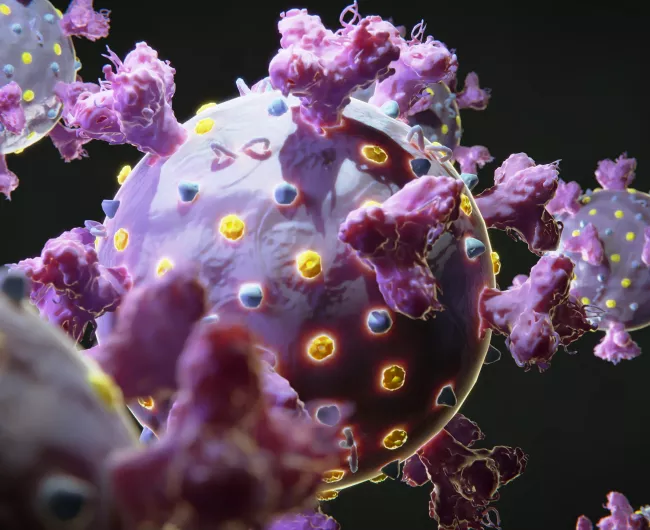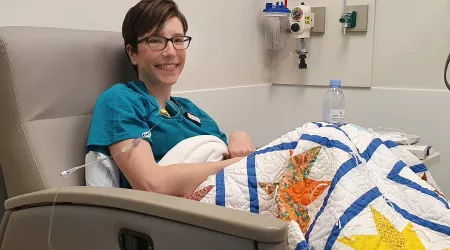3X Match My Gift
Act now through 12/31! Triple your impact to support colorectal cancer patients, survivors, and caregivers.



The HER2 or ERBB2 gene (human epidermal growth factor receptor-2) is in each of the cells in the body and is in the same family as the EGFR gene.
The HER2 protein is a receptor, which is a microscopic “spike” that sticks out on the surface of almost all the cells in our body. HER2 genes are responsible for the communication between the cells to promote their growth, division, repair, and survival.

A normal cell and its nucleus have only a few HER2 receptors. Sometimes there is an abnormality in the cell and multiple HER2 genes are produced, which is called amplification.
When the HER2 gene is amplified, it produces excess receptors on the cell surface; this is called overexpression. Overexpression drives an uncontrolled growth of the cells, which is how a tumor forms.
The condition is not hereditary (germline mutation) and will not pass from one generation to another. HER2 gene amplification happens randomly as a somatic change in the tumor cells.


The National Comprehensive Cancer Network (NCCN) recommends HER2 biomarker testing in all patients diagnosed with stage IV (metastatic) colorectal cancer. Patients with HER2 amplification/overexpression do not respond well to EGFR inhibitors.
HER2 testing should be done before starting treatments with EGFR inhibitors such as cetuximab or panitumumab.
If you have a recurrence or new metastatic disease, your doctor may recommend HER2 testing for the new tumors to help direct your treatment.

Knowing the details of tumor biomarkers can help you and your doctor make decisions about personalized treatment with therapies tailored specifically to the characteristics of your tumor.
HER2 amplification is a predictive biomarker for poor response to treatment with EGFR inhibitors.

Colorectal tumors that have HER2 amplification and overexpression and are RAS and BRAF wild type should be treated with dual-targeted therapy against HER2. This includes the combination of trastuzumab with either pertuzumab or lapatinib, or with chemotherapy.

Every treatment has the potential to cause some side effects. Some people may be more sensitive than others to a particular drug. It also depends on your other treatments, medications, vitamins, and herbal supplements. For example, side effects could be worse if you are treated with radiation at the same time. Tell your doctor about all your medications, vitamins, supplements, and treatments.
Some of the most common side effects associated with HER2 inhibitors are nausea, skin problems, headache, dizziness, fatigue, diarrhea, constipation, joint or muscle pain, and anemia/low hemoglobin levels.
It is unlikely that you will have all of these side effects, but you might have some of them. Contact your doctor immediately if you are experiencing severe symptoms.

The 2025 ASCO Annual Meeting featured several important studies that could change how colorectal cancer is treated, including a pivotal study for BRAF V600E patients.

After a stage IV colorectal cancer diagnosis, Heather’s biomarker test revealed a critical mutation — opening the door to clinical trials and new hope.

Discover how knowing her G12C biomarker guided Lexie’s stage IV colorectal cancer treatment — from a shock diagnosis to HIPEC surgery — and why screening, research, and self-advocacy matter.